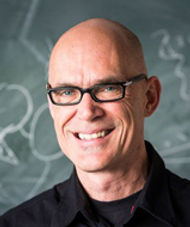Dutch Institute for Emergent Phenomena
Connecting the science of emergence across the Netherlands and beyond
The Dutch Institute for Emergent Phenomena (DIEP) is an interdisciplinary research centre across fundamental sciences with the purpose of furthering the understanding of emergent phenomena. It aims at understanding how the universe, space, time and the fundamental building blocks of matter emerged from the quantum world and how these building blocks aggregate forming the nano, molecular and polymeric structures that ultimately give rise to the macroscopic world we experience today. Emergent phenomena are extremely common in nature and their manifestation is based on the same underlying principles across sciences. Using analytic, numerical, experimental and philosophical methods available from quantum gravity, mathematics, physics, chemistry and philosophy of science, DIEP takes a transdisciplinary approach in tackling emergent behaviour. Integrated in the National Science Agenda (route 2), DIEP will gather research groups and scientists across the Netherlands and beyond and establish itself as a beacon for a new understanding of nature and emergence.
While emergent phenomena can be studied by a broad range of disciplines, including biology and social sciences, DIEP focuses on the study of the science of emergence in the areas of fundamental physics, chemistry, mathematics and history and philosophy of science. Nevertheless DIEP seeks to promote interdisciplinary collaborations between any of these sciences and others such as biology, social and network science. During the period 2018-2020, DIEP will bring together scientists, researchers and scholars in the Netherlands via regular visitors programme and a series of interdisciplinary workshops which will foster new collaborations and provide a road-map for a new research center. Research groups can become associated with DIEP and apply for travel grants via its visitors programme.
DIEP hard-core
From the microscopic to the mesoscopic and macroscopic scales and back requires different levels of expertise, from string theory, quantum theory, mathematics, condensed matter, chemistry, biophysics, supercomputers and philosophy of science.

Quantum gravity, string theory

Mathematical physics, philosophy of physics

Quantum matter

Condensed matter

Soft matter

Computational chemistry

String theory, coordination
and communication
Associated research groups
Answering some of the most fundamental questions about the universe requires a collaborative team effort.
Understanding how the macroscopic universe emerged from the quantum world, how the notions of space and time first came to be, how from the fundamental blocks of matter emerge large structures with novel behaviour requires a blend of scientific disciplines and the exploitation of the inter-connectivities between them. DIEP has gathered a multi-disciplinary team spanning a wide range of research groups.

Contact scientist: Jan de Boer
Emergence in quantum gravity and connections with condensed matter.


Contact scientist: Willem Kegel
EMERGENCE IN CHEMISTRY
Emergence in self-organizing systems from atomic scales to colloids. Connections with chemistry and biology.

Contact scientist: Alix McCollam
Emergence in correlated electron systems and condensed matter systems.


Contact scientist: Mark Golden
Quantum electron matter and emergent materials.


Contact scientist: Klaas Landsman
Non-commutative geometry and quantization theory. Relations between quantum theories and classical theories.

Contact scientist: Peter Bolhuis
Multi-scale modeling and simulation of complex molecular systems.
Creating understanding of emergent phenomena such as soft matter self-assembly, (nano)material properties, protein folding/aggregation, and self-organisation in active matter.
